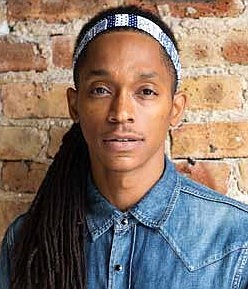FOUNDER OF THE HOPE IS FOUNDATION CREATES ENDOWMENT SCHOLARSHIP
David Robertson is the first Black alumni at Northeastern Illinois University to create an endowment
scholarship. The Hope Is Foundation Courageous Scholars Scholarship, geared toward first generation
Black and Latinx college students. Photos provided by David Robertson
David Robertson is the founder of the Hope Is Foundation, an organization that aims to expand local communities’ capacity to
respond to the health, educational and economic needs of the community.
Robertson has created the first endowed scholarship
by a Black alumnus of Northeastern Illinois University. He is seeking to raise $25,000 to establish the Hope Is Foundation Courageous
Scholars Scholarship, geared towards first generation Black and Latinx college students.
Robertson said he was blown away to find out that he was the first Black alumnus to create an endowment scholarship at NEIU. He
added, his goal is to encourage and inspire alumni who may want to support the cause, but who may not have the finances or time to do it. He said there are other ways for them to participate in college students’ lives.
“I created the scholarship because I remember sitting in the seats and needing assistance and looking for different scholarships that
would be applicable to people who look like me and there were not any,” stated Robertson. “I wanted to create a scholarship and an
award that really focused around community,” he added.
When he thinks about his experience in education, Robertson said, it was really because of community that he was able to go from
striving to thriving. He said he wants Black and Latinx students at NEIU to know that a stranger, a community of people can support them. He said it is important for people to know that while their family can support them, their neighbors and strangers can, too.
Robertson said when he looked at his career, and after receiving his Bachelor’s and Master’s Degrees, he realized there was a handful
of people who helped transform his experience and career or, as he describes it, “small hinges open big doors.” He said the people
weren’t in high positions nor were they well known. They were just people who allowed him to understand the power of networking and
mentorship. He said without his mentor, John Sykes, he wouldn’t have known about University Without Walls. He said that connection led him to meet Dr. Kim Sanborn, Dr. Durene Wheeler and Dr. Lance Williams.
“It was this community of people who sharpened me, who created opportunities for me to be vulnerable, but then, who also gave me the
capability to know that a degree was not just a piece of paper, but it was a stepping stone to helping my family and community,” he said.
Sanborn was immensely instrumental, Robertson continued, not only as it pertained to his education, but also as it related to his career. When he needed advice as a graduate student, Sanborn was there and advised him to expand upon what he already knew.
Sanborn also wrote a reference for him when he applied for the Master of Social Work program at Columbia University. “Being able just to have someone understand the depth of character, but then also heard me speak about my dreams and helped me navigate through it. And, that was just through being available,” he added.
Robertson said Sanborn saw opportunities and suggested he take advantage of them. He said it was those types of serendipitous relationships and opportunities that forged a goal in him to
beget those same opportunities.
Robertson said he wants other alumni to feel that sense of connectivity so they can help shape a positive narrative on college campuses.
As the numbers of Black and Brown students increase, Robertson added, they also want to retain those students so that they can be a part of the community.
“My thing is we don’t just get a degree, we’re part of a family,” he said
Latest Stories
- Condolences For Civil Rights Leader Rev. Jesse Lewis Jackson Continues To Pour In
- WDB L.E.G.A.C.Y. Weekend Celebrates 20 Years of Empowering Black-Owned Businesses
- Rail Merger Aims to Enhance Urban Quality of Life
- Raja Krishnamoorthi Introduces Universal Lunch Bill to Keep Illinois Children Fed
- ENDORSEMENTS CONTINUE TO ROLL IN FOR COOK COUNTY COMMISSIONER DR. KISHA McCASKILL
Latest Podcast
Get Your House In Order 2

